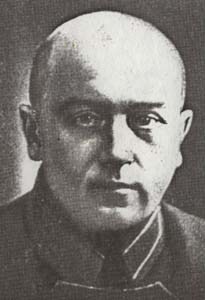Stanislav Messing

Stanislav Adamovich Messing (Russian: Станислав Адамович Мессинг) (1890, Warsaw, Russian Tsar Empire - September 2, 1937, Moscow, USSR) was a Soviet national party leader and a leader of the Soviet state security and intelligence bodies. He was a member of the Central Control Commission of the CPSU(b) from 1930 to 1934.[1][2]
Early life
[edit]Stanislav Messing was born into a Jewish family, the child of a musician and a midwife (accoucheuse). Due to financial difficulties, he only finished four classes in grammar school, after which he studied to become a locksmith. He eventually began working in a printing house.
Career
[edit]In 1908, he joined the Social Democratic Party of Poland, where he met Felix Dzerzhinsky and Józef Unszlicht, who had given him patronage after the Great Revolution of 1917. He was arrested several times and imprisoned in the Warsaw Fortress. In the same year, he was sentenced to administrative deportation to Belgium, where he earned his livelihood as an unskilled laborer. In 1911, Messing returned to his homeland and continued to participate in the activities of the Social Democratic Party of Poland. He was arrested again and then released.
In 1913, he was drafted into the army and served in Turkestan as a common soldier of the 17th Turkestan Regiment, which had been based at the Caucasian Front since 1914. In 1917, he was elected a member of the regimental soldiers' committee.[1][2]
Petrograd and Moscow
[edit]In the spring of 1917, during the Russian revolution, Messing was in Moscow and participated in street unrest. Immediately after the revolution he was appointed secretary of the Sokolniki Executive Committee and chairman of the Sokolniki District Cheka. Beginning in December 1918, Messing was the head of the secret operations department of the Moscow Cheek. In July 1920, he was approved a member of the VChK Council. On January 3, 1921, he was appointed chairman of the Moscow Cheka.[1] and in November of that year become chairman of Leningrad, then still called Petrograd[3]
Petrograd
[edit]In November 1921, Felix Dzerzhinsky, who directed the Red Terror during post-revolution Russia,[4] appointed Messing as chairman of the Petrograd Cheka. He held this rank from November 3, 1921, to February 6, 1922. Petrograd was a capital of Russia until 1922; in 1922, Moscow became the capital again.[1][2]
Moscow
[edit]In 1929, implicated in Bukharin-Kamenev affair and the poor health conditions of Mezhinsky, Trilisser lost out against Messing and Messing was appointed as second deputy chairman of OGPU.[5]
References
[edit]- ^ a b c d "Мессинг Станислав Адамович - История повседневности". www.el-history.ru.
- ^ a b c "ОГПУ: БЕСПОЩАДНАЯ БОРЬБА С ТЕРРОРОМ » Чекист.ru". www.chekist.ru. Archived from the original on 2018-05-16. Retrieved 2017-12-27.
- ^ Sommer, Tomasz (2014). Anty-Polska Operacja NKWD 1937-1938 (in Polish). 3S MEDIA Sp. z o.o. p. 31. ISBN 978-83-61935-81-0.
- ^ Harry Denny, New York Times July 1936
- ^ Stephen Kotkin. Stalin:Volume 2. New York: Penguin Press. p. 23.
- 1890 births
- 1937 deaths
- Politicians from Warsaw
- Politicians from Warsaw Governorate
- Social Democracy of the Kingdom of Poland and Lithuania politicians
- Polish communists
- Jews from the Russian Empire
- Soviet Jews
- Soviet people of Polish-Jewish descent
- Jewish socialists
- Old Bolsheviks
- Communist Party of the Soviet Union members
- Executive Committee of the Communist International
- Cheka
- NKVD officers
- Recipients of the Order of the Red Banner
- Jews executed by the Soviet Union
- Great Purge victims from Poland
- Soviet rehabilitations
